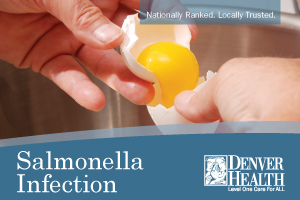Salmonellosis is an infection caused by the bacteria Salmonella. Every year, approximately 42,000 cases of salmonellosis are reported in the United States. Because many cases are not diagnosed or reported, the actual number of infections may be higher. It is estimated that approximately 400 persons die each year from Salmonella infection.
Learn more about Salmonella infection and find tips on how to avoid it by downloading our Salmonella Infection fact sheet. (Español)
What are the symptoms of infection?
- Most people develop diarrhea, fever and abdominal cramps six to 72 hours after infection. The illness usually lasts four to seven days,and most people recover with treatment.
- In rare cases people develop a severe infection which requires hospitalization. If not treated promptly, the infection can spread throughout the body and even cause death.
- A small number of people with Salmonella develop reactive arthritis, which can last for months or years and can lead to chronic arthritis which is difficult to treat.
Who is at risk for more severe illness?
The elderly, infants and people with impaired immune systems are likely to have a severe illness.
How do you get Salmonella?
Salmonella bacteria can be spread in several ways by eating contaminated food, handling certain animals and using poor hand washing practices.
People most often get a Salmonella infection by eating foods contaminated with animal feces. It is important to remember that contaminated foods can look and smell normal. Any food, including vegetables, may be contaminated, but foods that are most commonly contaminated with Salmonella are:
- Beef
- Poultry
- Milk
- Eggs
Salmonella may also be found in the feces of animals including:
- Pets and livestock
- Chicks and young birds, pet birds such as parakeets
- Reptiles such as turtles, lizards and snakes
- Rodents such as mice, hamsters and guinea pigs
- Salmonella can also be found in some pet foods and pet treats.
- Salmonella germs can be spread by an infected person who did not wash their hands with soap after using the bathroom.
- Salmonella can also be spread from person-to-person in places like childcare facilities, residential living facilities such as nursing homes or group homes, and through certain types fo seual contact (e.g., oral-anal contact).
How can avoid Salmonella infection?
- Thorough cooking of food including poultry, ground beef and eggs, kills Salmonella. Do not eat or drink foods containing raw eggs or raw (unpasteurized) milk.
- Keep uncooked meats separate from produce and cooked and ready-to-eat foods.
- Wash hands, kitchen surfaces and utensils with soap and water immediately after they have been in contact with raw meat or poultry.
- Always wash your hands immediately after handling a reptile or bird, even if the animal is healthy.
- Always wash your hands with soap and water after using the bathroom or changing diapers.
- In the childcare setting, dispose of stool and soiled diapers in a sanitary manner.
When to call your doctor
Most people don't need to seek medical attention for a salmonella infection because it clears up on its own within a few days. However, in cases involving infants, young children, the elderly or people with impaired immune systems, call your doctor if symptoms last more than a few days.
Sources:



